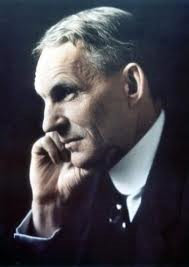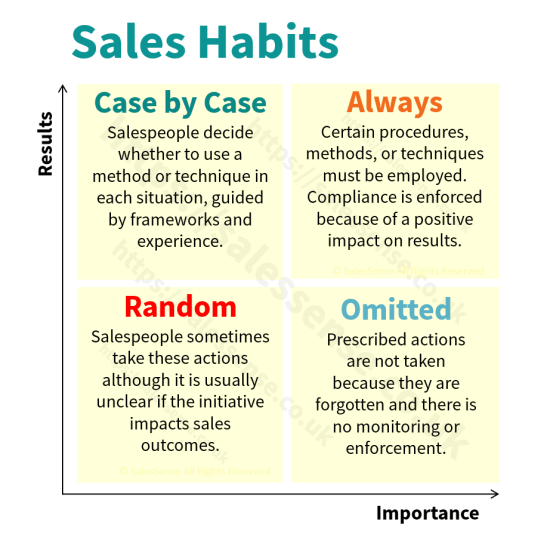Achieve what you set out to by changing habits, rather than applying willpower.

It is not the outside world that stands in the way of personal achievement, only ourselves. Achieving more depends on changing habits.
"I am the captain of my fate, I am the master of my destiny", wrote Henry Ford. You may not hanker after his fame or even his fortune, yet to have made a difference; to have left a trail; a legacy for people to remember us by. Isn't this a worthwhile purpose?
To steer our ship, we must have a destination and an idea of how to get there. You will have heard about setting sales goals and breaking them up into objectives. If the objectives are too big to be overcome by willpower, we are to break them up into tasks.
How do people achieve huge goals?
The theory says if you plan every step and then take each step, you will eventually reach your goal. You just put one foot in front of the other. The smaller the steps, the less willpower is needed. No matter how small each step, it takes you closer to accomplishing your purpose.
The difficulties associated with achieving goals lie not in knowing how, nor in obstacles set in our path. Sometimes one's feet become rooted among the obstructions we set out to cross. "The chains of habit are too weak to be felt until they are too strong to be broken." wrote Samuel Johnson.
Changing habits is a greater obstacle than any external obstruction or challenge. We need a force greater than willpower to break the chains of habit.
Some decades ago I gave up smoking. As stories go it lacks drama but illustrates the substance and illusionary nature of barriers.
Like many would-be non-smokers, I had faced the difficulties of this particular trail many times. Speaking from experience, one of the challenges stemmed from the size of the obstacles. They are so small. They are more like scree on a steep slope than boulders on the path. The likelihood of backsliding makes one loathe to announce the effort.
This time it IS different. How many times have you heard that before, or even said it to yourself as you clamber over the first of your most daunting boulders? When I finally gave up in 1998, it really was different. There weren't any boulders or even scree! Looking back, I can see the path clearly. The rocks and boulders were never on the path in the first place.
The impediments to giving up smoking are roughly similar to any habits that we have allowed to become established. None of them have any real substance and anyone who doesn’t share the habit will tell you so.
Let's consider some habits that appear less damaging. Many people grapple with eating and drinking sensibly. These days most people in Western society eat and drink for pleasure rather than to stay alive. Putting yourself in charge of what goes in, or comes out, of your mouth is more difficult than it sounds.
Don’t you always know when you are consuming too much of something? Don’t you almost always notice when you are saying the wrong thing?
It's less obvious when the problem is doing too little of something, like sales prospecting. Failure to achieve sales goals happens early in the effort when we let ourselves off lightly. Our abdication is much easier to ignore yet it is still within awareness for those who pay attention.
The most common and recognisable habit involves breaking commitments to ourselves. One sure way of avoiding the associated guilt and stress is to avoid making any commitments.
I envy people who are satisfied with this. Some people feel no need to put their hand on the tiller and are happy to go where fortune and others take them. Most people I know want more life in their lives, in one form or another.
Suppose that you could completely eradicate the habit of breaking commitments you make to yourself. What might you accomplish? What would you decide to do? The possibilities would be almost unlimited. Nothing short of death could stop you from achieving goals or accomplishing almost anything.
Let’s consider the things that stand in our way. What are the problems that cause people to fail themselves by not doing what they decide to do?
Imagine you have decided to exercise three times a week for at least thirty minutes. You kept to your commitment for a couple of weeks but now you have let things slip and you are struggling to exercise once a week. What went wrong? Here are some common responses:
- Thinking about the unpleasant bits
- It became too difficult to find the time
- Other tasks became more urgent
- Other tasks seemed more interesting
- Interruptions and crises used up the time
- I became afraid of failing on other projects
You can probably find other ways to express the excuses we make for ourselves, but one thing should be clear from thinking about this: None of these reasons have intrinsic substance. The obstacles that keep us from meeting commitments to ourselves are born and powered by ideas in our own minds. Changing habits depends on changing how we think.
Who is truly the master, our intellect or our automatic response system?
Much of what we are, say and do is automatic, based on the emotion attached to our memories. We cannot take full conscious control. If we could, we might forget to breathe.
If this is true, how is it possible to choose and behave as one intends?
It all depends on how we remember what happens to us. The way we record events is automatic. The memory has to be there before we can think about it. What we think about an event in the past changes the flavour of the memory. We can reinforce the feelings that are stored with a memory or begin to change them.
With a little effort, we can change how we remember any event.
The real value of thought is not as a means of self-control but as a method of adjusting how we respond to what happens to us.
How we experience moments of decision and, therefore, how we decide, depends on how we remember the consequences of similar decisions.
If you are struggling to meet your commitments to yourself, examine those memories that support your resolve and those that resist it. Examine your values, convictions and beliefs to recognise how they support or undermine promises you make to yourself.
Changing Habits - How I Gave Up Smoking
Sometimes the choice is between overturning deeply held values or abandoning a commitment. Sometimes it is simply a matter of perceiving the same thing differently.
Freedom has always been important to me. It is a deeply held value for many in our society. My addiction to cigarettes had a lot to do with defending my freedom. It took me several months to throw the switch and connect freedom to not smoking. Then willpower wasn't necessary.
Now I don’t have to furtively hide the habit from my children. Instead of scuttling off to the garden or my study for a smoke, I can relax in any room of my house. I am free to enjoy all the places barred to smokers. I am free from the prison of my addiction.
Once I changed the circuit and connected freedom with abstention, the obstacles disappeared.
Changing Habits Without Willpower

Here is a guide with answers to common questions:
How do I change habits without relying on willpower?
Willpower is useful for starting, but it’s unreliable as a long-term engine. A more dependable approach is to change the meaning you attach to the behaviour, so your automatic response system begins to work with you instead of against you.
Practical steps:
Identify the benefit you believe the habit gives you (comfort, relief, reward, freedom, control).
Reframe that benefit so it is more strongly linked to the new behaviour than the old one.
Make the new behaviour easy to start and hard to avoid (remove friction, add prompts, reduce choice at the moment of decision).
When the “circuit” changes, effort drops. The habit stops feeling like a battle.
Why does willpower fail even when my goal matters to me?
Because willpower is a momentary resource, and habits are automatic programmes triggered by cues (time, mood, context, people). When you’re tired, stressed, rushed, or distracted, your brain tends to choose the familiar pattern with the fastest emotional payoff.
Willpower often fails when:
the reward is immediate (relief/pleasure) but the benefit is delayed (health/results),
the cue is frequent (every day, multiple times),
the environment keeps re-triggering the routine.
In other words: you’re not “weak” — you’re running a well-practised script.
How long does habit change take?
It depends on the behaviour, the cue frequency, and how many competing habits are in the way. Some changes happen quickly when the “meaning” flips (as in your smoking example), but most require repetition.
A useful rule of thumb:
2-4 weeks to feel the first shift (less resistance, fewer lapses),
6-10 weeks to feel “normal” more often than not,
3+ months for many habits to become stable across busy or stressful periods.
The best indicator isn’t the calendar, it’s whether the new behaviour happens even when you’re not in the mood.
What’s the best way to stop breaking commitments to myself?
Start by treating self-commitments like business commitments: specific, scheduled, and reviewable.
Commit to the minimum viable action (e.g., 10 minutes, one call, one page, one walk).
Define the trigger: “When X happens, I do Y” (after coffee, before lunch, after the school run).
Track it visibly for 14 days (a simple tick-sheet works).
If you miss, don’t renegotiate the goal, repair the system (cue, time, friction, environment).
Your aim is not perfection. Your aim is to become someone who keeps promises to yourself as a default.
What should I do when motivation disappears?
Assume motivation will disappear, then design for it.
Reduce activation energy: make starting almost trivial.
Remove decision points: choose the time/place in advance.
Use a “two-minute rule”: do the first two minutes no matter what (often momentum follows).
Reconnect the behaviour to a value you actually care about (freedom, competence, pride, health, family, mastery).
Motivation is a feeling. Systems survive feelings.
How can I change a work habit like procrastination or avoiding sales prospecting?
Work habits are often maintained by a short-term emotional payoff: avoiding discomfort, rejection, uncertainty, or the fear of “wasting time”. The fix is to change what the action means and to make the first step small and defined.
Try this:
Replace “prospecting” with a clear micro-task: “Call 3 people” or “Send 5 tailored emails”.
Set a short timebox (15–25 minutes).
Make the metric behaviour-based (dials, conversations, outreach attempts), not outcome-based (appointments).
Tie the habit to identity: “I’m the sort of salesperson who does the difficult thing early.”
Prospecting becomes easier when it stops being a referendum on your worth and becomes simply a professional routine.
Article by Clive Miller
Related Material:
- Change Sales Habits and Behaviour with Ease
- Motivating Behavioural Change
- How to Learn Faster
- 17 Ways to Change
- A Coach Will Make You Do It
- Benchmark Key Performance Indicators
- Better Ways to Bring About Learning
- The Key to Exceptional Performance
Learn how to get leverage on yourself and motivate behavioural change in part three of Clive Miller's free accelerated learning micro course. See it here.
If you keep doing the same things, you are likely to keep getting the same results. Changing habits is difficult. If you need support to change or need to change the way things are done in a sales team, we can help. Telephone +44 (0)1392 851500. We will be pleased to discuss your needs or talk through some options. Email custserv@salessense.co.uk or use the contact form here.
















